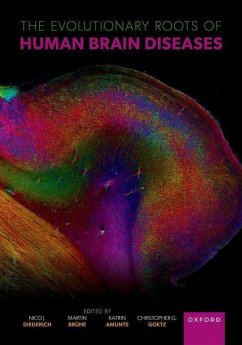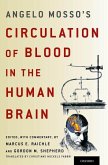The Evolutionary Roots of Human Brain Diseases
Herausgeber: Diederich, Nico J; Goetz, Christopher G; Amunts, Katrin; Brüne, Martin
The Evolutionary Roots of Human Brain Diseases
Herausgeber: Diederich, Nico J; Goetz, Christopher G; Amunts, Katrin; Brüne, Martin
- Gebundenes Buch
- Merkliste
- Auf die Merkliste
- Bewerten Bewerten
- Teilen
- Produkt teilen
- Produkterinnerung
- Produkterinnerung
The Evolutionary Roots of Human Brain Diseases assembles recent findings in clinical neuroscience, evolutionary biology, anthropology, and cellular biology to elucidate the origins of human brain diseases and how evolution has given rise to exclusive impacts on brain health only in humans. The book is succinct, up-to-date, and written by researchers across numerous disciplines, making it a compulsory read for clinical neurologists, psychologists, and all medical researchers interested in the brain.
Andere Kunden interessierten sich auch für
![Evolutionary Biology Evolutionary Biology]() Michael T. Clegg / Max K. Hecht / Ross J. MacIntyre (Hgg.)Evolutionary Biology187,99 €
Michael T. Clegg / Max K. Hecht / Ross J. MacIntyre (Hgg.)Evolutionary Biology187,99 €![The Roots of Visual Awareness The Roots of Visual Awareness]() C.A. Heywood / A.D. Milner / C. BlakemoreThe Roots of Visual Awareness341,99 €
C.A. Heywood / A.D. Milner / C. BlakemoreThe Roots of Visual Awareness341,99 €![Sleep: Evolution and Functions Sleep: Evolution and Functions]() Vibha M. JhaSleep: Evolution and Functions75,99 €
Vibha M. JhaSleep: Evolution and Functions75,99 €![Tandem Repeat Polymorphisms Tandem Repeat Polymorphisms]() Tandem Repeat Polymorphisms112,99 €
Tandem Repeat Polymorphisms112,99 €![Sleep: Evolution and Functions Sleep: Evolution and Functions]() Vibha M. JhaSleep: Evolution and Functions75,99 €
Vibha M. JhaSleep: Evolution and Functions75,99 €![Textbook of Evolutionary Psychiatry and Psychosomatic Medicine Textbook of Evolutionary Psychiatry and Psychosomatic Medicine]() Martin BrüneTextbook of Evolutionary Psychiatry and Psychosomatic Medicine121,99 €
Martin BrüneTextbook of Evolutionary Psychiatry and Psychosomatic Medicine121,99 €![Angelo Mosso's Circulation of Blood in the Human Brain Angelo Mosso's Circulation of Blood in the Human Brain]() Marcus E RaichleAngelo Mosso's Circulation of Blood in the Human Brain105,99 €
Marcus E RaichleAngelo Mosso's Circulation of Blood in the Human Brain105,99 €-
-
-
The Evolutionary Roots of Human Brain Diseases assembles recent findings in clinical neuroscience, evolutionary biology, anthropology, and cellular biology to elucidate the origins of human brain diseases and how evolution has given rise to exclusive impacts on brain health only in humans. The book is succinct, up-to-date, and written by researchers across numerous disciplines, making it a compulsory read for clinical neurologists, psychologists, and all medical researchers interested in the brain.
Hinweis: Dieser Artikel kann nur an eine deutsche Lieferadresse ausgeliefert werden.
Hinweis: Dieser Artikel kann nur an eine deutsche Lieferadresse ausgeliefert werden.
Produktdetails
- Produktdetails
- Verlag: Oxford University Press
- Seitenzahl: 576
- Erscheinungstermin: 26. Juli 2024
- Englisch
- Abmessung: 256mm x 185mm x 29mm
- Gewicht: 1379g
- ISBN-13: 9780197676592
- ISBN-10: 0197676596
- Artikelnr.: 70149485
- Herstellerkennzeichnung
- Libri GmbH
- Europaallee 1
- 36244 Bad Hersfeld
- gpsr@libri.de
- Verlag: Oxford University Press
- Seitenzahl: 576
- Erscheinungstermin: 26. Juli 2024
- Englisch
- Abmessung: 256mm x 185mm x 29mm
- Gewicht: 1379g
- ISBN-13: 9780197676592
- ISBN-10: 0197676596
- Artikelnr.: 70149485
- Herstellerkennzeichnung
- Libri GmbH
- Europaallee 1
- 36244 Bad Hersfeld
- gpsr@libri.de
Nico J. Diederich, MD, is Adjunct Professor of Neurology at the University of Cologne, Germany, and a Consultant in Neurology at the Centre Hospitalier de Luxembourg. His research and clinical work focus on movement disorders particularly Parkinson's disease (PD), from visual deficits to sleep syndromes or dysautonomia. Martin Brüne, MD, is Professor of Psychiatry and Head of the Division of Social Neuropsychiatry and Evolutionary Medicine at the LWL University-Hospital, Ruhr-University Bochum, Germany. He was previously a Visiting Research Scientist at the Centre for the Mind, a joint venture of the Australian National University and University of Sydney. Katrin Amunts, PhD, is Professor Director of the C. and O. Vogt Institute for Brain Research, HHU Duesseldorf, and of the Institute of Neuroscience and Medicine (INM-1), Research Center Juelich. Since 2023, she holds the position of Joint CEO of the non-profit EBRAINS AISBL. Christopher G. Goetz, MD, is Professor of Neurological Sciences and Pharmacology at Rush Medical College, USA and oversees Research Development and Strategic Planning for the Parkinson and Movement Disorder Program. His research specialties are in pharmacology, neurochemistry, clinimetrics, and statistical modelling. He is past President of the International Parkinson and Movement Disorder Society and past Co-Editor-in-Chief of the journal, Movement Disorders.
* Foreword by Sten Grillner
* Introduction by the Editors, Nico J. Diederich, Martin Brüne, Katrin
Amunts, Christopher G. Goetz
* Part I: Human Brain Evolution: From Anatomy to Function
* Chapter 1: Human Telencephalization
* Katrin Amunts and Felix Ströckens
* Chapter 2: Evolutionary Aspects of Glial Expansion
* Pierre Magistretti, Patrick Hof , Corrado Cali, and Nicole Ackermans
* Chapter 3: The Contribution of Mitochondrial Evolution and
Dysfunction to Neurodegeneration
* Anne Grünewald, Sandro Pereira, and Kobi Wasner
* Chapter 4: Intrinsic Templates for Neurodegenerations Featuring
Disease-specific Axonal or Dendritic Vulnerability
* Toshiki Uchihara
* Chapter 5: Differences in Brain Gene Expression Between Humans and
Primates
* Geneviève Konopka and Emre Caglayan
* Chapter 6: Adapative Archaic Introgression
* Olga Dolgova and Oscar Lao
* Chapter 7: Goal-directed and Habitual Behaviors: Anatomical and
Functional Circuits in Health and Neurological Disease
* Ledia F. Hernandez and Ignacio Obeso
* Part II: How Human Brain Diseases Are Impacted By Human Evolution
* Chapter 8: Alzheimer's Disease, the Parietal Lobes, and the Evolution
of the Human Genus
* Emiliano Bruner and Heidi I.L. Jacobs
* Chapter 9: Parkinson's Disease - Overstrain Focused of Basal Ganglia
and Brainstem Nuclei
* Nico J. Diederich and Christopher G. Goetz
* Chapter 10: Brain Diseases Associated with Unstable Repeats
* Peng Jin, Katharine Shelly, and Emily G. Allen
* Chapter 11: The Properties of Cortico-Motoneuronal Connections and
Their Evolutionary Significance for Amyotrophic Lateral Sclerosis
* Roger Lemon
* Chapter 12: REM Sleep Behavior Disorder - Nocturnal Replay of a
"Fight and Flee"
* Nico Diederich and Isabelle Arnulf
*
* Chapter 13: Mood Disorders: An Evolutionary
Psycho-Neuro-Immunological Approach
* Markus J Rantala Javier I. Borráz-León
*
* Chapter 14: Schizophrenia - Embracing the Spectrum
* John S. Allen
*
* Chapter 15: Williams Syndrome and Autism - Dysfunction of Frontal
Networks
* Katerina Semendeferi and Isabel August
*
* Chapter 16: ADHD - An Evolutionary View
* Annie Swanepoel
*
* Chapter 17: Addiction - Diverted Reward and Motivation Principles
* Roger Sullivan and Edward Hagen
* Part 3: Consequences and perspectives on research and clinical
sciences
* Chapter 18: Conditions of Comparative Brain Connectomics
* Kathleen Rockland, Daniel Zachlod, and Katrin Amunts
*
* Chapter 19: Are Evolutionary Concepts Helfpul in Designing Preventive
Strategies for Brain Diseases?
* Gilberto Levy and Bruce Levin
*
* Chapter 20: Evolutionary Aspects of Neuro-Psychopharmocology
* Martin Brüne, Riadh Abed, and Paul St. John-Smith
*
* Chapter 21: Ongoing Human Evolution?
* Frank Rühli, Maciej Henneberg, and Nicole Bender
*
* Chapter 22: Human Cultural Evolution Outpaces Biological Evolution: A
Brain Connectomic Approach
* Jean-Pierre Changeux
*
* Chapter 23: Concluding Remarks and Future Directions
* Martin Brüne, Katrin Amunts, Nico J. Diederich, and Christopher G.
Goetz
* Introduction by the Editors, Nico J. Diederich, Martin Brüne, Katrin
Amunts, Christopher G. Goetz
* Part I: Human Brain Evolution: From Anatomy to Function
* Chapter 1: Human Telencephalization
* Katrin Amunts and Felix Ströckens
* Chapter 2: Evolutionary Aspects of Glial Expansion
* Pierre Magistretti, Patrick Hof , Corrado Cali, and Nicole Ackermans
* Chapter 3: The Contribution of Mitochondrial Evolution and
Dysfunction to Neurodegeneration
* Anne Grünewald, Sandro Pereira, and Kobi Wasner
* Chapter 4: Intrinsic Templates for Neurodegenerations Featuring
Disease-specific Axonal or Dendritic Vulnerability
* Toshiki Uchihara
* Chapter 5: Differences in Brain Gene Expression Between Humans and
Primates
* Geneviève Konopka and Emre Caglayan
* Chapter 6: Adapative Archaic Introgression
* Olga Dolgova and Oscar Lao
* Chapter 7: Goal-directed and Habitual Behaviors: Anatomical and
Functional Circuits in Health and Neurological Disease
* Ledia F. Hernandez and Ignacio Obeso
* Part II: How Human Brain Diseases Are Impacted By Human Evolution
* Chapter 8: Alzheimer's Disease, the Parietal Lobes, and the Evolution
of the Human Genus
* Emiliano Bruner and Heidi I.L. Jacobs
* Chapter 9: Parkinson's Disease - Overstrain Focused of Basal Ganglia
and Brainstem Nuclei
* Nico J. Diederich and Christopher G. Goetz
* Chapter 10: Brain Diseases Associated with Unstable Repeats
* Peng Jin, Katharine Shelly, and Emily G. Allen
* Chapter 11: The Properties of Cortico-Motoneuronal Connections and
Their Evolutionary Significance for Amyotrophic Lateral Sclerosis
* Roger Lemon
* Chapter 12: REM Sleep Behavior Disorder - Nocturnal Replay of a
"Fight and Flee"
* Nico Diederich and Isabelle Arnulf
*
* Chapter 13: Mood Disorders: An Evolutionary
Psycho-Neuro-Immunological Approach
* Markus J Rantala Javier I. Borráz-León
*
* Chapter 14: Schizophrenia - Embracing the Spectrum
* John S. Allen
*
* Chapter 15: Williams Syndrome and Autism - Dysfunction of Frontal
Networks
* Katerina Semendeferi and Isabel August
*
* Chapter 16: ADHD - An Evolutionary View
* Annie Swanepoel
*
* Chapter 17: Addiction - Diverted Reward and Motivation Principles
* Roger Sullivan and Edward Hagen
* Part 3: Consequences and perspectives on research and clinical
sciences
* Chapter 18: Conditions of Comparative Brain Connectomics
* Kathleen Rockland, Daniel Zachlod, and Katrin Amunts
*
* Chapter 19: Are Evolutionary Concepts Helfpul in Designing Preventive
Strategies for Brain Diseases?
* Gilberto Levy and Bruce Levin
*
* Chapter 20: Evolutionary Aspects of Neuro-Psychopharmocology
* Martin Brüne, Riadh Abed, and Paul St. John-Smith
*
* Chapter 21: Ongoing Human Evolution?
* Frank Rühli, Maciej Henneberg, and Nicole Bender
*
* Chapter 22: Human Cultural Evolution Outpaces Biological Evolution: A
Brain Connectomic Approach
* Jean-Pierre Changeux
*
* Chapter 23: Concluding Remarks and Future Directions
* Martin Brüne, Katrin Amunts, Nico J. Diederich, and Christopher G.
Goetz
* Foreword by Sten Grillner
* Introduction by the Editors, Nico J. Diederich, Martin Brüne, Katrin
Amunts, Christopher G. Goetz
* Part I: Human Brain Evolution: From Anatomy to Function
* Chapter 1: Human Telencephalization
* Katrin Amunts and Felix Ströckens
* Chapter 2: Evolutionary Aspects of Glial Expansion
* Pierre Magistretti, Patrick Hof , Corrado Cali, and Nicole Ackermans
* Chapter 3: The Contribution of Mitochondrial Evolution and
Dysfunction to Neurodegeneration
* Anne Grünewald, Sandro Pereira, and Kobi Wasner
* Chapter 4: Intrinsic Templates for Neurodegenerations Featuring
Disease-specific Axonal or Dendritic Vulnerability
* Toshiki Uchihara
* Chapter 5: Differences in Brain Gene Expression Between Humans and
Primates
* Geneviève Konopka and Emre Caglayan
* Chapter 6: Adapative Archaic Introgression
* Olga Dolgova and Oscar Lao
* Chapter 7: Goal-directed and Habitual Behaviors: Anatomical and
Functional Circuits in Health and Neurological Disease
* Ledia F. Hernandez and Ignacio Obeso
* Part II: How Human Brain Diseases Are Impacted By Human Evolution
* Chapter 8: Alzheimer's Disease, the Parietal Lobes, and the Evolution
of the Human Genus
* Emiliano Bruner and Heidi I.L. Jacobs
* Chapter 9: Parkinson's Disease - Overstrain Focused of Basal Ganglia
and Brainstem Nuclei
* Nico J. Diederich and Christopher G. Goetz
* Chapter 10: Brain Diseases Associated with Unstable Repeats
* Peng Jin, Katharine Shelly, and Emily G. Allen
* Chapter 11: The Properties of Cortico-Motoneuronal Connections and
Their Evolutionary Significance for Amyotrophic Lateral Sclerosis
* Roger Lemon
* Chapter 12: REM Sleep Behavior Disorder - Nocturnal Replay of a
"Fight and Flee"
* Nico Diederich and Isabelle Arnulf
*
* Chapter 13: Mood Disorders: An Evolutionary
Psycho-Neuro-Immunological Approach
* Markus J Rantala Javier I. Borráz-León
*
* Chapter 14: Schizophrenia - Embracing the Spectrum
* John S. Allen
*
* Chapter 15: Williams Syndrome and Autism - Dysfunction of Frontal
Networks
* Katerina Semendeferi and Isabel August
*
* Chapter 16: ADHD - An Evolutionary View
* Annie Swanepoel
*
* Chapter 17: Addiction - Diverted Reward and Motivation Principles
* Roger Sullivan and Edward Hagen
* Part 3: Consequences and perspectives on research and clinical
sciences
* Chapter 18: Conditions of Comparative Brain Connectomics
* Kathleen Rockland, Daniel Zachlod, and Katrin Amunts
*
* Chapter 19: Are Evolutionary Concepts Helfpul in Designing Preventive
Strategies for Brain Diseases?
* Gilberto Levy and Bruce Levin
*
* Chapter 20: Evolutionary Aspects of Neuro-Psychopharmocology
* Martin Brüne, Riadh Abed, and Paul St. John-Smith
*
* Chapter 21: Ongoing Human Evolution?
* Frank Rühli, Maciej Henneberg, and Nicole Bender
*
* Chapter 22: Human Cultural Evolution Outpaces Biological Evolution: A
Brain Connectomic Approach
* Jean-Pierre Changeux
*
* Chapter 23: Concluding Remarks and Future Directions
* Martin Brüne, Katrin Amunts, Nico J. Diederich, and Christopher G.
Goetz
* Introduction by the Editors, Nico J. Diederich, Martin Brüne, Katrin
Amunts, Christopher G. Goetz
* Part I: Human Brain Evolution: From Anatomy to Function
* Chapter 1: Human Telencephalization
* Katrin Amunts and Felix Ströckens
* Chapter 2: Evolutionary Aspects of Glial Expansion
* Pierre Magistretti, Patrick Hof , Corrado Cali, and Nicole Ackermans
* Chapter 3: The Contribution of Mitochondrial Evolution and
Dysfunction to Neurodegeneration
* Anne Grünewald, Sandro Pereira, and Kobi Wasner
* Chapter 4: Intrinsic Templates for Neurodegenerations Featuring
Disease-specific Axonal or Dendritic Vulnerability
* Toshiki Uchihara
* Chapter 5: Differences in Brain Gene Expression Between Humans and
Primates
* Geneviève Konopka and Emre Caglayan
* Chapter 6: Adapative Archaic Introgression
* Olga Dolgova and Oscar Lao
* Chapter 7: Goal-directed and Habitual Behaviors: Anatomical and
Functional Circuits in Health and Neurological Disease
* Ledia F. Hernandez and Ignacio Obeso
* Part II: How Human Brain Diseases Are Impacted By Human Evolution
* Chapter 8: Alzheimer's Disease, the Parietal Lobes, and the Evolution
of the Human Genus
* Emiliano Bruner and Heidi I.L. Jacobs
* Chapter 9: Parkinson's Disease - Overstrain Focused of Basal Ganglia
and Brainstem Nuclei
* Nico J. Diederich and Christopher G. Goetz
* Chapter 10: Brain Diseases Associated with Unstable Repeats
* Peng Jin, Katharine Shelly, and Emily G. Allen
* Chapter 11: The Properties of Cortico-Motoneuronal Connections and
Their Evolutionary Significance for Amyotrophic Lateral Sclerosis
* Roger Lemon
* Chapter 12: REM Sleep Behavior Disorder - Nocturnal Replay of a
"Fight and Flee"
* Nico Diederich and Isabelle Arnulf
*
* Chapter 13: Mood Disorders: An Evolutionary
Psycho-Neuro-Immunological Approach
* Markus J Rantala Javier I. Borráz-León
*
* Chapter 14: Schizophrenia - Embracing the Spectrum
* John S. Allen
*
* Chapter 15: Williams Syndrome and Autism - Dysfunction of Frontal
Networks
* Katerina Semendeferi and Isabel August
*
* Chapter 16: ADHD - An Evolutionary View
* Annie Swanepoel
*
* Chapter 17: Addiction - Diverted Reward and Motivation Principles
* Roger Sullivan and Edward Hagen
* Part 3: Consequences and perspectives on research and clinical
sciences
* Chapter 18: Conditions of Comparative Brain Connectomics
* Kathleen Rockland, Daniel Zachlod, and Katrin Amunts
*
* Chapter 19: Are Evolutionary Concepts Helfpul in Designing Preventive
Strategies for Brain Diseases?
* Gilberto Levy and Bruce Levin
*
* Chapter 20: Evolutionary Aspects of Neuro-Psychopharmocology
* Martin Brüne, Riadh Abed, and Paul St. John-Smith
*
* Chapter 21: Ongoing Human Evolution?
* Frank Rühli, Maciej Henneberg, and Nicole Bender
*
* Chapter 22: Human Cultural Evolution Outpaces Biological Evolution: A
Brain Connectomic Approach
* Jean-Pierre Changeux
*
* Chapter 23: Concluding Remarks and Future Directions
* Martin Brüne, Katrin Amunts, Nico J. Diederich, and Christopher G.
Goetz








